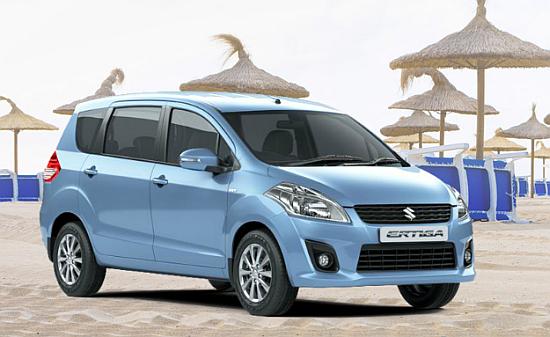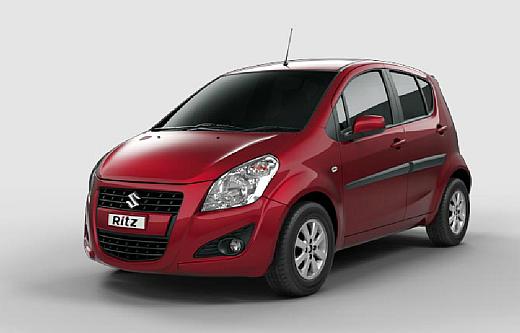Photographs: Reuters Sharmistha Mukherjee in New Delhi
The automobile sector has been in the slow lane for the last two years and the market leader in passenger vehicles, Maruti Suzuki, has been no exception.
Labour woes at its Manesar units for two consecutive years eroded Maruti's profitability and resulted in a 7 per cent loss in market share. However, the company is headed for a turnaround in FY14.
For starters, it expects a pickup in the demand for petrol cars, even as the diesel segment continues to record strong volumes.
Increased engagement in localisation programmes and favourable cross-currency movements would translate into lower payouts in the coming quarters, helping shore up the bottom line.
Though recovery is expected to be slow due to weak macroeconomic conditions, the optimism is evident from the steady demand for the company's vehicles.
Chief operating officer (marketing and sales) Mayank Pareek says, "In the first nine months this year, we have grown 8.3 per cent. We lost 77,000 units due to the labour trouble at Manesar. Otherwise, we would have grown 15 per cent."
To boost volumes, the management has put in place an export strategy. Currently, exports account for 10 per cent of total volumes.
...
How Maruti plans to change its fortune
Image: Shinzo Nakanishi, chief executive and managing director of Maruti Suzuki, poses with company's new compact SUV XA Alpha.Photographs: Adnan Abidi/Reuters
The company intends to raise this to 15 per cent by FY16-17. Financial services group CLSA says, "New export revenue streams like Ertiga kit exports to Indonesia and petrol engine sales to other Suzuki subsidiaries would boost export revenues further. This is a good strategic move."
The company has entered new markets in Latin America, Africa and South-east Asia.
Chief Financial Officer Ajay Sheth says, "Four years earlier, Europe accounted for about 70 per cent of our exports. We diversified into emerging markets and today, non-European countries account for about 80 per cent of our foreign sales. We want to step up exports 8 to 9 per cent of our net sales. This would act as a natural hedge and help offset adverse currency movements."
Maruti has also been refurbishing its product portfolio to meet the evolving needs of the market.
Though Pareek declines to comment on the products to be introduced, the company is understood to be working on a compact sports utility vehicle based on the XA Alpha concept, as well as three sedans across the entry mid-size and premium sedan segments.
...
How Maruti plans to change its fortune
Image: Maruti ErtigaPhotographs: Courtesy, Maruti Suzuki India
To increase reach and penetration, the company would continue to increase the number of its dealer outlets (currently 1,150) at existing, as well as new locations.
Since its launch in April last year, the Ertiga has already sold about 60,000 units and accounts for about a third of the market in its category.
The refurbished Alto 800 has seen sales of 50,000 units, despite the fact that it is available only in petrol-powered versions.
If diesel prices were to correct further, the demand for petrol would improve sharply, given the 20-25 per cent premium on diesel cars, says Barclays.
At present, 38 per cent of the company's sales are accounted for by diesel models. It has a combined order backlog of 130,000 units of mid-range cars Swift, DZire and Ertiga, about 90 per cent of which are for diesel variants.
The share of diesel vehicles in the company's sales mix is expected to rise to 43 per cent over the next two years, a shift expected to add to the company's bottom line.
...
How Maruti plans to change its fortune
Image: Recently, Maruti gave a facelift to Ritz Diesel.Photographs: Courtesy, Maruti Suzuki India
"Our margins were impacted by 100 basis points due to higher discounts. The change in the product mix in favour of diesel vehicles will help improve profitability. We have also seen increased sales of the new Alto, on which there are no discounts," says Sheth.
CLSA expects the company's operating profit margin to improve to about 10 per cent by FY15, driven by a weaker yen, a better product mix and increased localisation.
The low base of the last two years would also work to Maruti Suzuki's advantage in FY14. In FY12 and FY13, the company was plagued by labour strikes, which led to a production loss of 1,60,000 units and decelerated profitability.
After the second quarter, currency cross-currents have also favoured the company; its payouts for imports have dropped.
"In the last five years, we lost about nine per cent in margins because of the yen-rupee movement," says Sheth.
Now, the company has tied up with vendors to introduce various programmes aimed at reducing import costs from 26 per cent of net sales to 16 per cent through the next three years.
Broadly, the market believes both internal, as well as external factors are positive for Maruti, something apparent from the upgrades it has seen ahead of the new financial year.






article